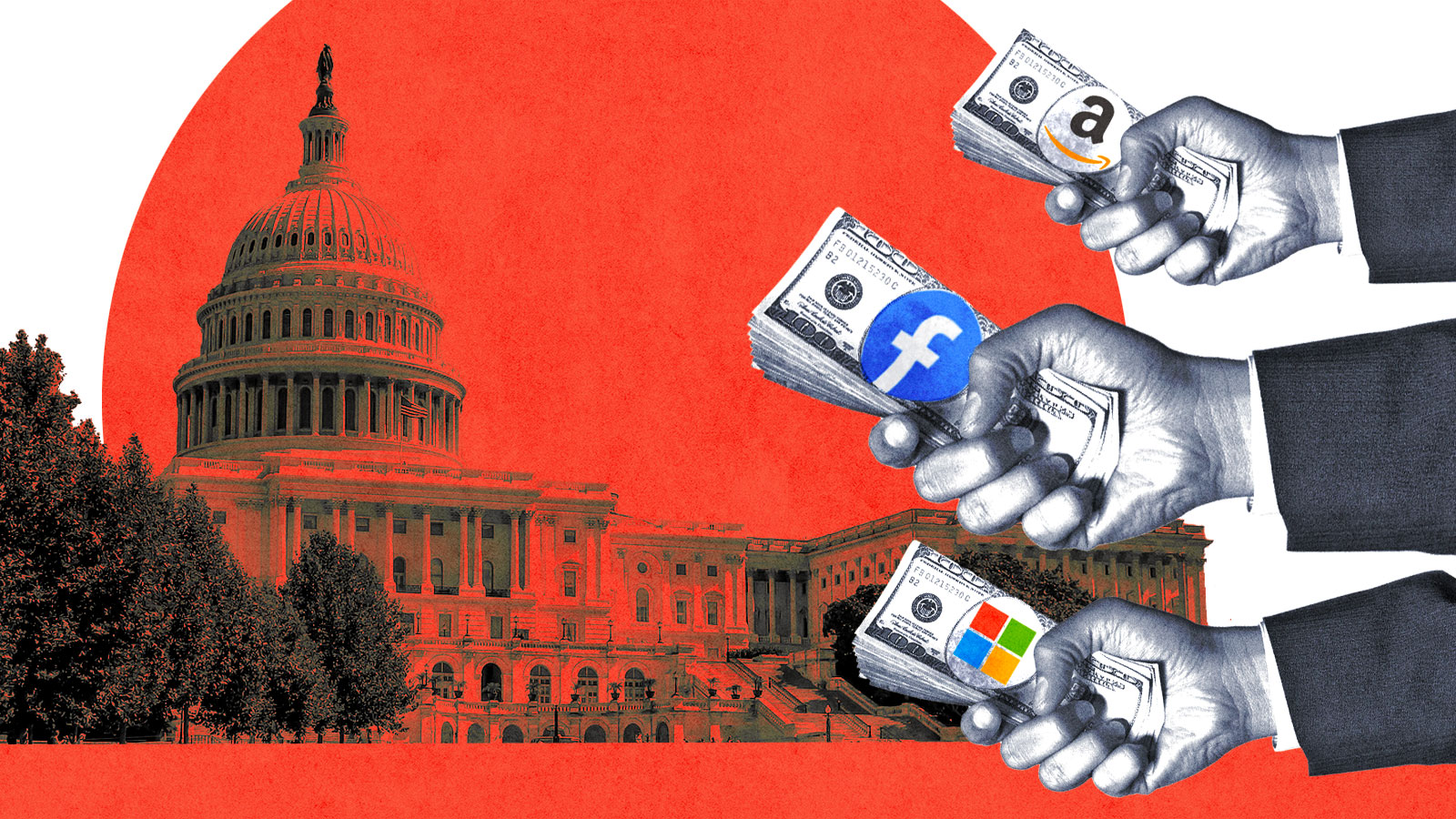It’s hard to quantify political power, It�
Only a tiny fraction of Big Tech’s legislative lobbying might is going toward advocating for climate policy, according to a new report from the think tank InfluenceMap. Between 2019 and 2020, just 4 percent of Apple, Alphabet (Google’s parent company), Amazon, Facebook, and Microsoft’s self-reported lobbying activities targeted climate-related policy at the federal level. In Europe, these companies do even less lobbying on climate — InfluenceMap says they have been “largely silent on the EU’s ambitious climate policy agenda.”
This halfhearted effort to promote climate-friendly policies stands in sharp contrast to Big Tech’s much-publicized promises to lead the rest of the business sector, and indeed the entire world, toward a greener future.
Apple, for instance, revealed a plan last summer to make its supply chain and products carbon neutral by 2030, something CEO Tim Cook said will be good for the planet and its products. “With our commitment to carbon neutrality, we hope to be a ripple in the pond that creates a much larger change,” Cook said. In 2019, Amazon unveiled a climate plan that aims to get the company to meet the decarbonization requirements of the Paris Agreement 10 years early. “If we can do this, anyone can do this,” Amazon founder Jeff Bezos said at the time.
“Climate change is a crisis we will only be able to address if we all work together on a global scale,” Facebook founder Mark Zuckerberg said. Facebook aims to make its global operations net-zero, starting with making its value chain net-zero by 2030. “We will support new public policy initiatives to accelerate carbon reduction and removal opportunities,” Microsoft president Brad Smith wrote in January last year, outlining seven principles the company will adhere to in its quest to remove more emissions than it produces by 2030 and eliminate all of its emissions since 1975 by mid-century. “We know that no company, no matter how ambitious, can solve a challenge like climate change alone,” Google said in its sustainability report last September.
It’s clear that these companies like to talk about climate action being a collective effort. But despite the many detailed climate plans and pledges, Big Tech has done strikingly little government-level work to bring about the global-scale climate action it says it wants to see. The little lobbying the Big Five do has been largely focused on technical rules that are directly tied to these companies’ abilities to stick to their climate commitments, like procuring enough renewable energy. Meanwhile, the world is nowhere near where it needs to be to meet the climate targets outlined in the Paris Agreement.
“Relative to their scale, they invest very little in saving the planet,” Nic Bryant, a spokesperson for the climate activist group Extinction Rebellion, told Grist, referring to tech companies. “These companies could and should be leading the way.”
What’s more, tech companies are being vastly out-lobbied by Big Oil, the InfluenceMap report found. Chevron, Shell, ExxonMobil, ConocoPhillips, and BP directed, on average, 38 percent of their legislative lobbying to climate-related policies between 2019 and 2020. Much of that lobbying activity was, unsurprisingly, against climate policy.
And during Donald Trump’s presidency, when the federal government did virtually nothing to address the climate crisis and some states tried to pick up the slack, the five major tech companies engaged on climate policy at the state level in less than half of the 22 states where they are headquartered, own data centers, or have regional offices.
“We worked from a list of almost 50 major climate bills that have been proposed in states over the last few years, and we found that Big Tech engaged on only a couple of them,” Kendra Haven, U.S. engagement manager for InfluenceMap, told Grist. Apple, Google, and Facebook, all headquartered in California, did almost no lobbying in the state, which has an aggressive climate agenda. Chevron, by comparison, also based in California, dedicated 51 percent of its disclosed lobbying activities to climate policy there.
“These companies have statements that indicate climate is a shared problem that needs to be addressed by society as a whole,” Dylan Tanner, executive director of InfluenceMap, told Grist. “The question to investors and stakeholders in the tech companies is, given this huge power and then your statements on climate, do you want to leave it up to a few oil and gas companies to decide the broad agenda on climate?”
Further complicating Big Tech’s stance on climate are its membership in industry associations. InfluenceMap scored each of the Big Five tech companies on the climate-friendliness of the industry groups they belong to. These are organizations like the Chamber of Commerce, the most powerful trade organization in the world, which has lobbied extensively against climate policy, as well as groups with progressive agendas like the Renewable Energy Buyers Alliance. By looking at Big Tech’s membership in industry associations across the board, InfluenceMap found “misalignment between the companies’ own climate lobbying positions and those of their industry associations.”
“Big Tech has no problem shelling out tens of millions of dollars jockeying for their own interests in Washington, so we know their failure to lobby for climate solutions is not due to a lack of means, but a lack of will,” David Arkush, director of the climate program at the nonprofit consumer advocacy organization Public Citizen, told Grist. “If they’re serious about climate, they need to push for government climate action at the scale and speed we need.”
Representatives for two of the tech companies named in the report asserted that they take climate change seriously. “Amazon believes that both private and public sector leadership is required to address the scale of the challenge, and we actively advocate for policies that promote clean energy and address climate change,” a spokesperson for Amazon told Grist. “We believe government action is a critical tool to advance climate solutions, and we will continue advocating for policies that address the urgency of the climate crisis.”
“We’re committed to fighting climate change and are taking substantive steps without waiting for any legislative action,” a spokesperson for Facebook told Grist.
Spokespeople for Alphabet, Apple, and Microsoft did not respond to Grist’s request for comment prior to this article’s publication.



